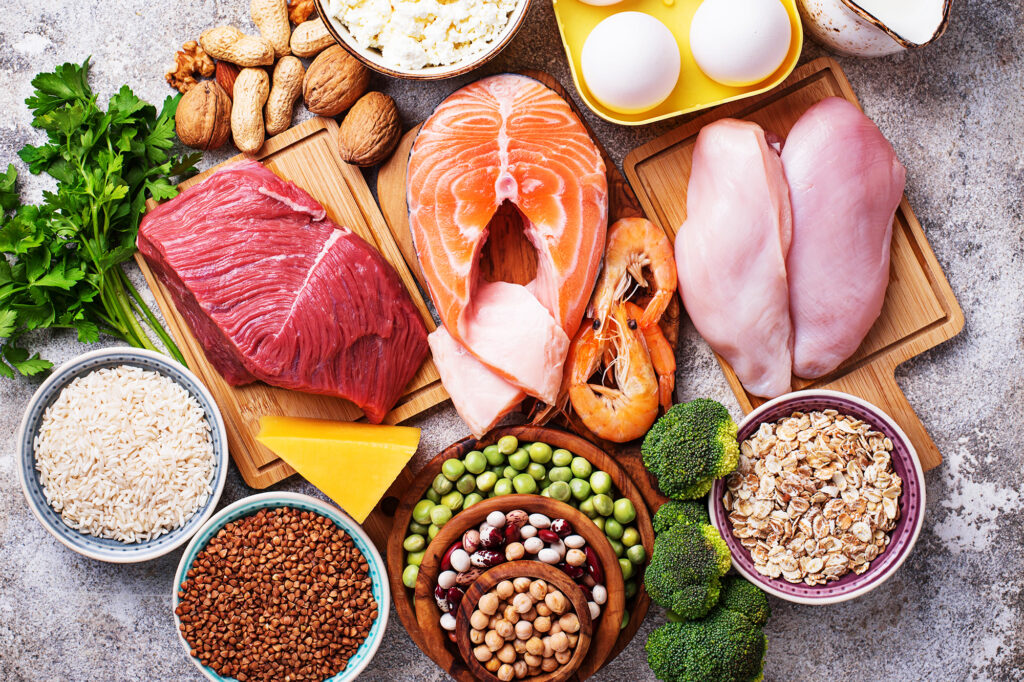Pulse of Information
Your source for the latest insights and updates.
Protein Palooza: Feast Your Way to Fitness
Discover delicious protein-packed recipes and tips to fuel your fitness journey. Feast your way to a healthier, stronger you!
Top 10 Protein-Packed Foods to Supercharge Your Fitness Journey
When it comes to boosting your fitness journey, incorporating protein-packed foods into your diet is essential. Protein is the building block of muscles and plays a crucial role in recovery, making it a priority for anyone looking to improve their strength and endurance. Here, we explore the top 10 protein-packed foods that can help you supercharge your fitness:
- Chicken Breast: A lean source of protein, grilled chicken breast is versatile and can be added to salads, wraps, or eaten on its own.
- Quinoa: This grain is not only gluten-free but also contains all nine essential amino acids, making it a complete protein.
- Eggs: Packed with protein and nutrients, eggs are an excellent choice for breakfast or a snack.
- Cottage Cheese: High in casein protein, cottage cheese is perfect for muscle recovery.
- Greek Yogurt: Creamy and delicious, Greek yogurt contains nearly double the protein of regular yogurt.
- Tofu: A fantastic option for vegetarians, tofu is a versatile, protein-rich alternative to meat.
- Salmon: Rich in omega-3 fatty acids and protein, salmon supports muscle growth and heart health.
- Lentils: Full of fiber and protein, lentils are great for maintaining energy levels during workouts.
- Chickpeas: A tasty legume, chickpeas can be added to salads or blended into hummus for a nutritious snack.
- Beef: Lean cuts of beef are not only a great source of protein but also vital nutrients like iron and B12.

The Ultimate Guide to Protein for Muscle Building: What You Need to Know
When it comes to muscle building, understanding the role of protein is crucial. Protein is a macronutrient that serves as the building block for muscles, helping to repair and grow muscle fibers after exercise. The general recommendation for those engaged in strength training is to consume about 1.6 to 2.2 grams of protein per kilogram of body weight per day. This can be achieved through various sources such as lean meats, fish, dairy products, beans, and legumes. Additionally, carefully timing your protein intake can enhance muscle recovery and growth, particularly by consuming protein-rich foods within a 30-minute window post-workout.
To optimize your muscle building results, consider incorporating a variety of protein sources into your diet. Here are some top choices:
- Chicken Breast: A lean source of protein that is versatile and widely available.
- Eggs: Packed with essential amino acids and healthy fats.
- Greek Yogurt: High in protein and beneficial probiotics.
- Quinoa: A complete protein source that is also gluten-free.
- Whey Protein: A convenient supplement, ideal for post-workout recovery.
Focusing on a protein-rich diet, combined with an effective strength training program, can significantly enhance your muscle growth and overall fitness journey.
How Much Protein Do You Really Need? Debunking Common Myths
When it comes to protein intake, many people are confused about how much they really need. Common myths suggest that you must consume excessive amounts of protein, often exceeding 2 grams per kilogram of body weight, especially for those looking to build muscle. However, research indicates that the average adult only needs about 0.8 grams of protein per kilogram of body weight to maintain health. In this context, it’s important to note that factors such as age, activity level, and overall health can significantly influence your protein requirements.
Another prevalent myth is that you must consume protein at every meal to achieve optimal results. While spreading your protein intake throughout the day can be beneficial, your body is capable of utilizing protein consumed at various times. For most individuals, aiming for a total daily intake that meets their personalized needs is sufficient. As a general guideline, consider incorporating a variety of protein sources such as lean meats, dairy, legumes, and nuts to ensure a well-rounded diet without falling for these common misconceptions.